Class 11 Physics Motion in a Straight Line – Get here the Notes for Class 11 Physics Motion in a Straight Line. Candidates who are ambitious to qualify the Class 11 with good score can check this article for Notes. This is possible only when you have the best CBSE Class 11 Physics study material and a smart preparation plan. To assist you with that, we are here with notes. Hope these notes will helps you understand the important topics and remember the key points for exam point of view. Below we provided the Notes of Class 11 Physics for topic Motion in a Straight Line.
- Class: 11th
- Subject: Physics
- Topic: Motion in a Straight Line
- Resource: Notes
CBSE Notes Class 11 Physics Motion in a Straight Line
Candidates who are pursuing in Class 11 are advised to revise the notes from this post. With the help of Notes, candidates can plan their Strategy for particular weaker section of the subject and study hard. So, go ahead and check the Important Notes for Class 11 Physics Motion in a Straight Line from this article.
Motion
If an object changes its position with respect to its surroundings with time, then it is called in motion.
Rest
If an object does not change its position with respect to its surroundings with time, then it is called at rest.
[Rest and motion are relative states. It means an object which is at rest in one frame of reference can be in motion in another frame of reference at the same time.]
Point Mass Object An object can be considered as a point mass object, if the distance travelled by it in motion is very large in comparison to its dimensions.
Types of Motion
1. One Dimensional Motion
If only one out of three coordinates specifying the position of the object changes with respect to time, then the motion is called one dimensional motion.
For instance, motion of a block in a straight line motion of a train along a straight track a man walking on a level and narrow road and object falling under gravity etc.
2. Two Dimensional Motion
If only two out of three coordinates specifying the position of the object changes with respect to time, then the motion is called two dimensional motion.
A circular motion is an instance of two dimensional motion.
3. Three Dimensional Motion
If all the three coordinates specifying the position of the object changes with respect to time, then the motion is called three dimensional motion.
A few instances of three dimension are flying bird, a flying kite, a flying aeroplane, the random motion of gas molecule etc.
Distance
The length of the actual path traversed by an object is called the distance.
It is a scalar quantity and it can never be zero or negative during the motion of an object.
Its unit is metre.
Displacement
The shortest distance between the initial and final positions of any object during motion is called displacement. The displacement of an object in a given time can be positive, zero or negative.
It is a vector quantity.
Its unit is metre.
Speed
The time rate of change of position of the object in any direction is called speed of the object.
Speed (v) = Distance travelled (s) / Time taken (t)
Its unit is m/s.
It is a scalar quantity.
Its dimensional formula is [MoT-1].
Uniform Speed
If an object covers equal distances in equal intervals of time, then its speed is called uniform speed.
Non-uniform or Variable Speed
If an object covers unequal distances in equal intervals of time, then its speed is called non-uniform or variable speed.
Average Speed
The ratio of the total distance travelled by the object to the total time taken is called average speed of the object.
Average speed = Total distanced travelled / Total time taken
If a particle travels distances s1, s2, s3 , … with speeds v1, v2, v3, …, then
Average speed = s1 + s2 + s3 + ….. / (s1 / v1 + s2 / v2 + s3 / v3 + …..)
If particle travels equal distances (s1 = s2 = s) with velocities v1 and v2, then
Average speed = 2 v1 v2 / (v1 + v2)
If a particle travels with speeds v1, v2, v3, …, during time intervals t1, t2, t3,…, then
Average speed = v1t1 + v2t2 + v3t3 +… / t1 + t2 + t3 +….
If particle travels with speeds v1, and v2 for equal time intervals, i.e., t1 = t2 = t3, then
Average speed = v1 + v2 / 2
When a body travels equal distance with speeds V1 and V2, the average speed (v) is the harmonic mean of two speeds.
2 / v = 1 / v1 + 1 / v2
Instantaneous Speed
When an object is travelling with variable speed, then its speed at a given instant of time is called its instantaneous speed.

Instantaneous speed =
Velocity
Tlie rate of change of displacement of an object in a particular direction is called its velocity.
Velocity = Displacement / Time taken
Its unit is m/s.
Its dimensional formula is [MoT-1].
It is a vector quantity, as it has both, the magnitude and direction.
The velocity of an object can be positive, zero and negative.
Uniform Velocity
If an object undergoes equal displacements in equal intervals of time, then it is said to be moving with a uniform velocity.
Non-uniform or Variable Velocity
If an object undergoes unequal displacements in equal intervals of time, then it is said to be moving with a non-uniform or variable velocity.
Relative Velocity
Relative velocity of one object with respect to another object is the time rate of change of relative position of one object with respect to another object.
Relative velocity of object A with respect to object B
VAB = VA – VB
When two objects are moving in the same direction, then

When two objects are moving in opposite direction, then

When two objects are moving at an angle, then
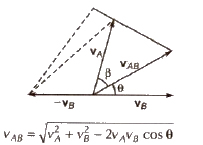
and tan β = vB sin θ / vA – vB cos θ
Average Velocity
The ratio of the total displacement to the total time taken is called average velocity.
Average velocity = Total displacement / Total time taken
Acceleration
The time rate of change of velocity is called acceleration.
Acceleration (a) = Change in velocity (Δv) / Time interval (Δt)
Its unit is m/s2
Its dimensional formula is [MoLT-2].
It is a vector quantity.
Acceleration can be positive, zero or negative. Positive acceleration means velocity increasing with time, zero acceleration means velocity is uniform while negative acceleration (retardation) means velocity is decreasing with time.
If a particle is accelerated for a time t1 with acceleration a1 and for a time t2 with acceleration a2, then average acceleration
aav = a1t1 + a2t2 / t1 + t2
Different Graphs of Motion
Displacement – Time Graph
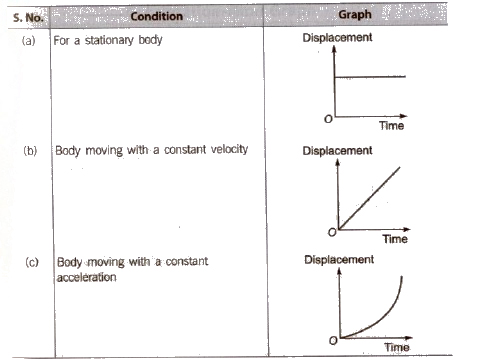
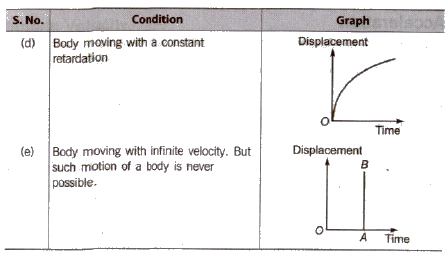
Note Slope of displacement-time graph gives average velocity.
Velocity – Time Graph
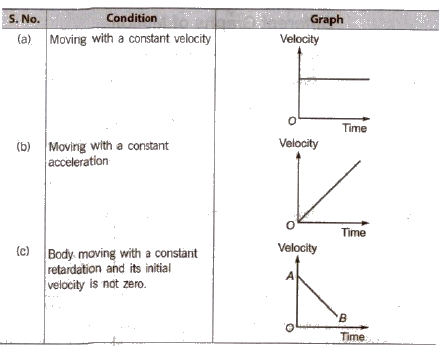
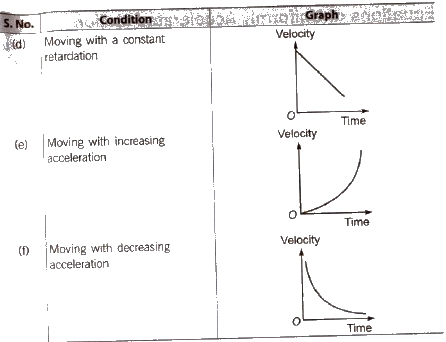
Note Slope of velocity-time graph gives average acceleration.
Acceleration – Time
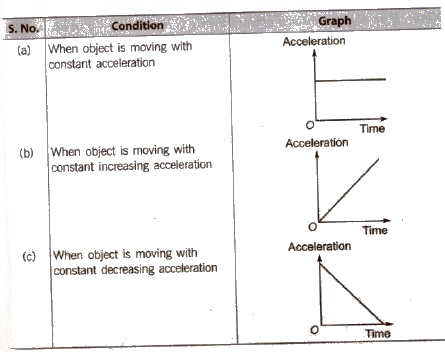
Equations of Uniformly Accelerated Motion
If a body starts with velocity (u) and after time t its velocity changes to v, if the uniform acceleration is a and the distance travelled in time t in s, then the following relations are obtained, which are called equations of uniformly accelerated motion.
(i) v = u + at
(ii) s = ut + at2
(iii) v2 = u2 + 2as
(iv) Distance travelled in nth second.
Sn = u + a / 2(2n – 1)
If a body moves with uniform acceleration and velocity changes from u to v in a time interval, then the velocity at the mid point of its path
√u2 + v2 / 2
Motion Under Gravity
If an object is falling freely (u = 0) under gravity, then equations of motion
(i) v = u + gt
(ii) h = ut + gt2
(iii) V2 = u2 + 2gh
Note If an object is thrown upward then g is replaced by – g in above three equations.
It thus follows that
(i) Time taken to reach maximum height
tA = u / g = √2h / g
(ii) Maximum height reached by the body
hmax = u2 / 2g
(iii) A ball is dropped from a building of height h and it reaches after t seconds on earth. From the same building if two ball are thrown (one upwards and other downwards) with the same velocity u and they reach the earth surface after t, and t2 seconds respectively, then
t = √t1t2
(iv) When a body is dropped freely from the top of the tower and another body is projected horizontally from the same point, both will reach the ground at the same time.
Class 11 Key Points, Important Questions & Practice Papers
Hope these notes helped you in your schools exam preparation. Candidates can also check out the Key Points, Important Questions & Practice Papers for various Subjects for Class 11 in both Hindi and English language form the link below.
Class 11 NCERT Solutions
Candidates who are studying in Class 11 can also check Class 11 NCERT Solutions from here. This will help the candidates to know the solutions for all subjects covered in Class 11th. Candidates can click on the subject wise link to get the same. Class 11 Chapter-wise, detailed solutions to the questions of the NCERT textbooks are provided with the objective of helping students compare their answers with the sample answers.
Class 11 Mock Test / Practice
Mock test are the practice test or you can say the blue print of the main exam. Before appearing in the main examination, candidates must try mock test as it helps the students learn from their mistakes. With the help of Class 11 Mock Test / Practice, candidates can also get an idea about the pattern and marking scheme of that examination. For the sake of the candidates we are providing Class 11 Mock Test / Practice links below.
Class 11 Exemplar Questions
Exemplar Questions Class 11 is a very important resource for students preparing for the Examination. Here we have provided Exemplar Problems Solutions along with NCERT Exemplar Problems Class 11. Question from very important topics is covered by Exemplar Questions for Class 11.
CBSE Notes for Class 11 Physics Notes Biology Notes Maths Notes Chemistry Notes
To get study material, exam alerts and news, join our Whatsapp Channel.

